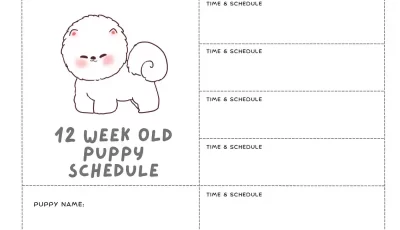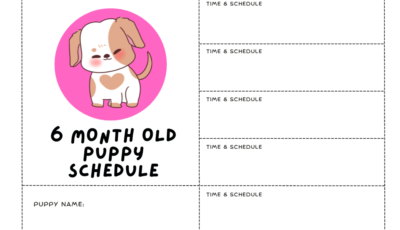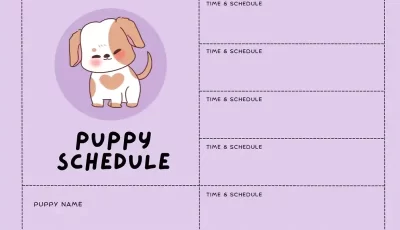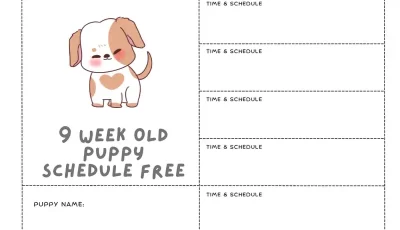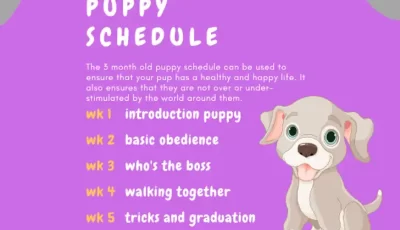A 4 month old puppy needs a lot of care and attention. Here is a 4 month old puppy schedule for what you should do every day to ensure your puppy is healthy and happy.
Socializing your 4 month old puppy
The first thing to do is to introduce your puppy to the people in your household. This helps them become familiar with their environment’s new sights, sounds, and smells.
Introducing a new puppy into a household can be very stressful for everyone involved. The first thing you should do is introduce the puppy to everyone in your household. This will help them become familiar with their new surroundings and make them feel more comfortable.
Training your 4 month old puppy
A puppy’s training and socialization need to start early. When they are 4 months old, they will be more receptive to learning and understanding the world around them.
It is important to start teaching your puppy basic commands such as ‘sit,’ ‘stay,’ and ‘come.’ They will learn these commands faster than you might think at this age. Getting your pup used to different environments and meeting new people is also important.
Feeding your 4 month old puppy
Your puppy should eat thrice daily, with the first meal at about 8 am.
Puppies need to eat a lot of food to grow big and strong. Their food is usually determined by age, weight, and size.
The best way to feed your puppy is by using high-quality dry dog food or canned food mixed with water. You should also make sure that your pup has access to fresh water at all times.
Exercise for your 4 month old puppy
Puppies need exercise and playtime to stay healthy.
The following are some games you can play with your 4-month-old puppy:
- Keep a blanket or towel nearby.
- Place the pup on the blanket or towel and wait for them to lie down.
- Place a treat near their nose but out of reach.
- When they move to get the treat, use your hand to push them back onto the blanket or towel.
- Repeat this process until they have learned that lying down is the only way to get a treat.
- Once they have mastered this game, try moving away from them before giving them a treat.
- Repeat this process until they learn that if they stay on the blanket or towel, you will come back with treats!
Grooming your 4 month old puppy schedule
Grooming your 4 month old puppy is a bit different than grooming an older pup because the coat is still developing.
The hair in this growth stage is very fine and can easily mat as it grows, which can lead to skin problems like hot spots or infections, so it’s important to keep your pup’s fur well-groomed at this age.
If you’re not sure what kind of brush to use on your pup at this age, start with a slicker brush or a pin brush and work your way up from there as the fur gets thicker.
A good rule of thumb for brushing time is 10 minutes every day – but if you want to make sure that the matting doesn’t get out of hand, set aside 15-20 minutes each day for brushing.
Health concerns for your 4 month old puppy
Puppies are not immune to the common illnesses that affect humans. They are more susceptible to these illnesses because they have weaker immune systems and their bodies are still developing. The most common health concerns for puppies in their first 4 months of life include the following:
- Parvovirus – This highly contagious virus can cause vomiting and diarrhea. It can also lead to dehydration and death.
- Distemper – This upper respiratory infection can lead to coughing, sneezing, eye and nose discharge, fever, and seizures.
- Leptospirosis – This bacterial infection causes fever, vomiting, liver damage, kidney failure, meningitis (brain inflammation), or death.
- Kennel Cough – This is caused by bacteria, which spreads through droplets in the air when dogs cough or sneeze. It causes coughing spells with a distinctive, often wet sound.
- Otitis Media- This is the inflammation of the middle ear that can cause hearing loss and pain. In addition, it can lead to an infection in the ear canal or behind the eardrum that causes pus discharge from one or both ears.
Traveling with your 4 month old puppy
There are many considerations for taking a puppy on an airplane, and it’s important to do your research beforehand.
It would help if you planned by determining the requirements for taking your pet on the plane with you. Some airlines require that you have a large enough crate for your pet to stand up and turn around in, while others allow pets to stay in their carrier under the seat. It’s important to check with your airline before you fly so that you know what you need ahead of time.
Some airlines will also require that your pet has a health certificate from a veterinarian within ten days of flying with them – this is something else that should be checked before booking flights.
If you’re traveling by car, there are some things to consider. You may bring along water and food for yourself and your dog if you’re going for a long time. Secondly, you may want to avoid traveling at night.
Finally, if you’re renting a car and your dog is not already trained to ride in the car, it’s a good idea to order your dog into the back seat as soon as possible.
Remember, If you’re traveling by plane with your pet for more than 12 hours, it’s important that they have their boarding in place before boarding the flight.
Read Also: Best 3 Month old Puppy Schedule : Sleep, Grooming, Feeding, Exercise and Health Care
Fun ideas for your 4 month old puppy
Your 4 month old puppy is going to be a lot of fun! You can do all sorts of things with them, but these are some ideas for you to try out.
- Take your pup for a walk around the block
- Play fetch with them
- Take them on a trip to the dog park
- Use your pup as an excuse to visit friends and family more often
Tips for following a 4 month old puppy schedule
- Feed your puppy 3 times daily, morning, noon, and evening.
- Take them for a walk for 1-2 hours per day.
- Spend 15-30 minutes playing with your puppy each day to keep their mind stimulated and help them get rid of boredom and restlessness
- Give your puppy something new to chew on every day, like rawhide or a bully stick
- Have someone else in the house take care of your pup while you are gone for an extended period
What are the steps to make your 4 month-old puppies the perfect companion?
A puppy’s schedule is a crucial part of its development. A 4 month old puppy needs a lot of care and attention to grow into a strong and healthy dog.
Puppies must be fed three times daily, walked twice a day, and taken out for potty breaks at least once. This is not an easy task for any pet owner.
However, by following these steps, you will find that your 4 month old puppy will quickly become the perfect companion.
- Feeding- You can feed you 4 month old pup three times a day, but it’s best to start with two meals per day and then gradually increase the number as long as they are still hungry after every meal.
- Walking- Your 4 month old pup needs to be walked twice a day; morning and nighttime walks are important for their health, so make sure you have time in your schedule for this!
- Potty Breaks- Like adult dogs, your 4 month old pup needs to go outside for a potty break using a puppy pad. If this is not done regularly, your pup will start marking its territory all over the house.
- Training- Training should start as soon as possible with basic commands such as sit, stay, leave, and come and fetch.
- Socialization- Make sure you expose your 4 month old pup to new people, places, sounds, and experiences as often as possible.
- Stimulating Toys- Stimulate their mind by giving them toys that will keep them busy for a short period. For example, you could give your 4 month old pup a chew toy, puzzle toy, or tug toy.
- Exercise- Make sure you’ve already started exercising your 4 month old pup at this age to help prevent weight gain.
What to include in a 4 month old puppy schedule?
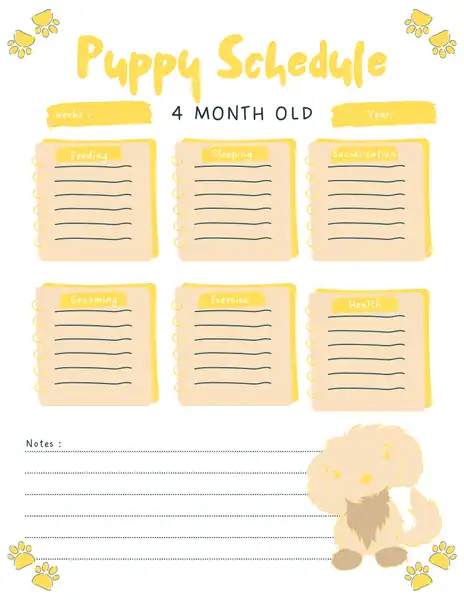
printable 4 month old puppy schedule
When you get a new puppy, setting up a schedule for them is important. A good schedule will help keep your pup happy and healthy. It will also help you know what to expect from your pup to adjust accordingly.
Your 4 month old puppy needs the following:
- sleeping schedule
- feeding schedule
- A walk every day
- A potty break every 2 hours
- At least 30 minutes of exercise per day
- Socialization with other dogs and people
Why a 4 month old puppy schedule is important?
Puppies need much attention and training to grow into well-mannered, obedient dogs. A 4 month old puppy schedule can help you stay on top of your pup’s needs to ensure they get the care they deserve.
Here are reasons why a 4 month old puppy schedule is important:
- You need to get them used to be home alone for short periods – this will help them be more comfortable when you leave them alone for longer periods.
- You need to keep their day structured, so they know what’s coming next – this will help with potty training and teaching them other manners.
- You want to ensure they get enough exercise and mental stimulation to keep them happy and healthy.
- You want to ensure they eat at the right times – this will help with their digestion and weight control.
- You want to ensure they get enough sleep, making them happier and more energetic.
- Limiting their “free time” is a good idea since it can lead to behavior problems like chewing or digging.
- It helps you keep an updated schedule for yourself to plan accordingly with work/school/etc.
The conclusion of this article is to show you how important a 4 month old puppy’s schedule is. There are many benefits of following a 4 month old puppy schedule. It helps you to be more organized and plan your days better.
